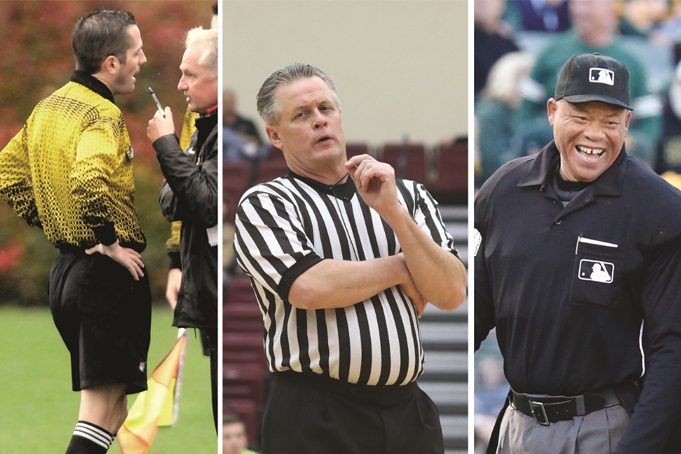Judgment is an old concept in terms of human history, and as time goes on, humans are constantly trying to regulate judgment and eliminate emotion, to the point of robotic consistency. The essence of the evolution of judgment makes it something else, something resembling a computer program. If each game or contest regulated by humans was made into a computer program and officiated by robots, those games would be boring, over-managed, terrible to play, even worse to watch.
To be an arbiter of fairness there must be context. When commentators proclaim that the first five minutes should be called the same as the last five minutes, they really demonstrate their lack of understanding of fairness and context. They are asking for vacuous objectivity. Fair does not mean the same, as your mom or dad uttered to you at some point. How do we get to a place that is consistent, objective and fair? Human, but not biased?
Emotion is part of the human condition, but certainly it can affect our ability to judge fairly. Rather than trying to not have emotions, officials need recognize and then manage different types of emotions to officiate in an objective and fair manner.
Personal emotions that are unrelated to the court or field
Did you just get bad news? Are you stressed out at work or excited for an event after the game? Those must be managed, talked about it in the pregame and acknowledged. Putting it out there will allow your partners to help keep you in the game. Take environmental action like turning off all devices at least two hours before the game so that you can focus on the contest.
Prior experience emotions
Maybe you have worked games involving a team before and you didn’t have the best experience. Talk about steps that the crew will take to ensure fairness and impartiality. A truly “clean slate” for every contest is hard but should be a goal. Only you know the thoughts that run through your mind in a contest. If that information gives you context without changing your calls, having that information is helpful. If having that information means you look for behaviors from a troublesome player or give out penalties more harshly, do not seek out that information. Monitor your own behavior and fight the emotional response that comes naturally in favor of the rational response you know is objective and fair.
Future outcomes emotions
Will something you do in that game (e.g. red card, flagrant foul or ejection) affect the player’s next game? It can take officials a long time to develop your “line” when it comes to big penalties. It is a terrible feeling to know that your gut told you to do something and instead you opted not to because your brain went too far into the future. One way to manage that is to do whatever it takes to stay in the moment and go with your gut.
Career-building emotions
Where there are people, there are politics. Big calls in big games can lead to controversy. Too much time spent thinking about “what if” and you’re done before the game has even started. That mindset can lead to over- or under-calling and either way it’s not fair to the athletes, the game or the skills you’ve worked so hard to develop. Keep in mind mentors who helped you get to where you are and emulate how they would call the game. Chances are they didn’t let that emotion come into play when they were working their way up the ladder and neither should you.
In-game emotions
Emotions have a way of intruding in games. They must be recognized, so you don’t abuse your power. Cope moment by moment. That is where having a happy place to go in your mind can help. I work with a woman who has a stressful day job and she is always happy at our games. She says, “Nothing that happens during that game is as stressful, emotional or high stakes as what I just came from.” That doesn’t mean she isn’t taking the game seriously; quite the opposite. She is in touch with her humanness and that is her way of bringing calm to the contest.
Maybe your serenity is a comparison like that: a deep breath or a phrase you add to your self-talk. Have something to calm you in those moments.
Emotions cannot be left in the locker room and a keen awareness of the emotions you bring is a key element to controlling them in order to be consistent and fair. Stay in control, know your triggers and have a plan. We are better than robots!
What's Your Call? Leave a Comment:
Note: This article is archival in nature. Rules, interpretations, mechanics, philosophies and other information may or may not be correct for the current year.
This article is the copyright of ©Referee Enterprises, Inc., and may not be republished in whole or in part online, in print or in any capacity without expressed written permission from Referee. The article is made available for educational use by individuals.


















